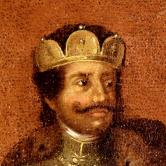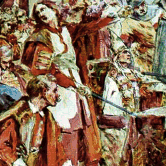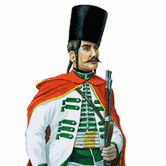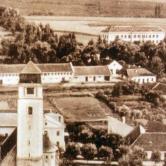History
Founding of the Town and the Middle Ages
The first recorded mention of establishing settlements in Križevci area was in a charter of King Bela III in 1193, in which the king mentions a county ruler, whereas the settlement of Križevci was first mentioned in 1209. The existence of a fortified town (lat. castrum) was first mentioned in 1223, and the Church of the Holy Cross in 1232. It is only on the basis of the historical records dating from this period that we can maintain that a settlement in Križevci area had existed. Detailed info...
Golden Bull
Fortified towns which were built in the mid 13th century and played an important role in the defense against the Tatars, were granted the status of Free Royal Borough by king Bela IV. The charter granting a town the status of a royal borough was named Golden Bull, and it was granted to, among other towns, Gradec and Samobor in 1242, Jastrebarsko in 1257, and Križevci in 1253. Detailed info...
Križevci Bloody Assembly
Križevci was the seat of State Assemblies of Slavonian, later joined by Croatian nobility, who discussed the issues related to their homeland, especially the issue of defense against the Turks. The most famous State Assembly is the one held in 1397. The Assembly was attended by representatives of two opposing sides-King Sigismund of Luxembourg and his supporters on one side, and Banus Stephan Lacković with his supporters on the other. They started a row which ended in bloodshed. This Assembly became known as Križevci Bloody Assembly. Detailed info...
Recent History
Križevci was an important cultural, economic, and military center of the County of Križevci from the 12th century until the year of 1921. It was on 28th of June, 1921, that the county was abolished, and the Constitution of the Kingdom of Serbs, Croats, and Slovenes (SHS) was first adopted. Following World War II, Croatia became part of the Socialist Federative Republic of Yugoslavia (SFRY), and Križevci was made the district and municipal center, and shortly thereafter only the municipal center. In 1993, after Croatia declared its independence from the former Yugoslavia, and proclaimed its own state, the Republic of Croatia, Križevci became a part of the Koprivnica-Križevci county, with Koprivnica as its center. Thereby, the influence Križevci had for centuries as a cultural and administrative center of northwestern Croatia diminished considerably. Detailed info...





